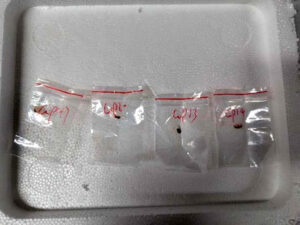
Two Chinese researchers have been charged with federal crimes for allegedly smuggling a dangerous fungal pathogen classified as a potential agricultural bioweapon into the United States. The case represents a significant national security concern involving possible foreign interference in American agricultural systems.
DOJ Announces Charges Against Chinese Researchers
The Department of Justice announced Tuesday that Yunqing Jian, 33, and Zunyong Liu, 34, both citizens of the People’s Republic of China, face federal charges for smuggling Fusarium graminearum into the United States. This fungus is classified in scientific literature as a potential agroterrorism weapon, making the charges particularly serious from a national security perspective.
Federal investigators allege that both defendants were receiving Chinese government funding for their research activities, with some work conducted at the University of Michigan. The case has raised significant concerns about foreign-funded research on American soil and potential threats to the nation’s agricultural infrastructure.
The Dangerous Pathogen at the Center of the Case
Understanding Fusarium Graminearum
Fusarium graminearum is a destructive fungal pathogen that poses serious threats to global food security. According to the FBI, this organism causes “head blight,” a devastating disease that affects critical crops including wheat, barley, maize, and rice. The pathogen is responsible for billions of dollars in economic losses worldwide each year, making it a weapon of particular concern for agricultural terrorism.
The classification of this fungus as a potential agroterrorism weapon highlights the vulnerability of modern agricultural systems to biological attacks. Such pathogens could be used to deliberately damage crop yields, disrupt food supplies, and cause significant economic harm to targeted regions.
Economic and Security Implications
The potential use of agricultural pathogens as weapons represents a growing concern for national security agencies. Unlike traditional weapons, biological agents targeting crops could cause widespread damage while being difficult to detect initially. The economic impact of such an attack could be devastating, affecting not only farmers but entire food supply chains and related industries.
Timeline of the Alleged Smuggling Operation
The Detroit Airport Incident
The investigation began on July 27, 2024, when Liu entered the United States through Detroit Metropolitan Airport. Initially, Liu told customs authorities he was visiting his girlfriend and planned to return to China to establish his own laboratory. He claimed to have no work materials in his possession.
However, secondary screening of Liu’s luggage revealed suspicious materials that would ultimately lead to federal charges. Customs and Border Protection officers discovered several concerning items hidden in his bags, including tissues concealing a handwritten note in Chinese, a round piece of filter paper with circles drawn on it, and four clear plastic bags containing small clumps of reddish plant material.
Initial Deception and Eventual Confession
When first questioned about the discovered materials, Liu denied knowledge of how they ended up in his luggage. He suggested that someone else had placed the items there without his knowledge, attempting to distance himself from the suspicious materials.
Under continued questioning, however, Liu’s story changed dramatically. He eventually admitted to deliberately placing the materials in his bag and intentionally concealing them from authorities. According to court documents, Liu acknowledged that he “intentionally hid the samples in his backpack because he knew there were restrictions on the importation of the materials.”
The defendant further admitted to concealing the samples in tissues specifically to avoid detection by CBP officers, allowing him to continue his research in the United States. This confession demonstrates clear intent to violate import restrictions and suggests premeditation in the smuggling attempt.
National Security Concerns and Communist Party Connections
Evidence of Foreign Government Ties
The Justice Department’s complaint alleges that Jian’s electronic devices contained information describing her membership in and loyalty to the Chinese Communist Party. This connection has raised significant national security concerns about the defendants’ true motivations and potential links to foreign government interests.
The relationship between the two defendants adds complexity to the case. Federal authorities allege that Jian and Liu were romantically involved while both conducting research on the same dangerous pathogen. Liu reportedly works at a Chinese university where he researches Fusarium graminearum, while Jian had access to laboratory facilities at the University of Michigan.
Foreign Funding Allegations
Both defendants allegedly received Chinese government funding for their research activities, raising questions about the true purpose of their work and potential foreign influence in American research institutions. This funding connection, combined with the alleged Communist Party membership and the nature of the smuggled pathogen, has intensified concerns about foreign interference in sensitive research areas.
Official Response from Law Enforcement
Attorney General’s Statement
Attorney General Pam Bondi emphasized the gravity of the situation in her public statement, declaring that the Justice Department “has no higher mission than keeping the American people safe and protecting our nation from hostile foreign actors who would do us harm.”
Bondi specifically praised the work of DOJ attorneys involved in the case, noting that the defendant “clandestinely attempted to bring a destructive substance into the United States” and would “face years behind bars” as a consequence of these alleged actions.
U.S. Attorney’s Perspective
U.S. Attorney Jerome Gorgan described the alleged actions as being “of the gravest national security concerns.” He emphasized that the defendants had been charged with smuggling what has been characterized as a “potential agroterrorism weapon” into America’s heartland, where they apparently intended to use University of Michigan laboratory facilities to advance their objectives.
Gorgan’s statement highlighted the particular concern that foreign nationals, including an alleged loyal member of the Chinese Communist Party, were attempting to conduct potentially dangerous research using American academic facilities.
Border Protection Officials Weigh In
Customs and Border Protection Director of Field Operations Marty C. Raybon emphasized CBP’s crucial role in protecting Americans from biological threats that could devastate the agricultural economy and harm civilians. He expressed particular concern about researchers from major universities attempting to secretly bring potentially harmful biological materials into the United States.
Raybon’s comments underscore the critical importance of border security measures in preventing the introduction of dangerous biological agents that could be used for harmful purposes.
University of Michigan’s Response
The University of Michigan issued a comprehensive statement late Tuesday afternoon addressing the serious allegations involving individuals connected to their institution. The university’s response addressed several key points designed to clarify their position and demonstrate institutional responsibility.
Condemnation of Alleged Actions
The university strongly condemned any actions that seek to cause harm, threaten national security, or undermine the university’s critical public mission. This statement represents a clear institutional stance against any activities that might compromise national security or public safety.
Funding Clarification
Importantly, the university clarified that it had received no funding from the Chinese government in relation to research conducted by the accused individuals. This clarification appears designed to address concerns about foreign government influence in university research activities and to distance the institution from potential conflicts of interest.
Cooperation with Law Enforcement
The university pledged full cooperation with federal law enforcement in the ongoing investigation and prosecution. This commitment demonstrates institutional support for national security efforts and suggests the university recognizes the serious nature of the allegations.
Legal Proceedings and Court Appearances
Jian was scheduled to appear Tuesday afternoon in federal court in Detroit for her initial appearance on the complaint. These legal proceedings represent a significant test case for prosecuting alleged agricultural bioterrorism threats and addressing foreign research activities that may pose national security risks.
The case highlights the complex legal challenges involved in prosecuting potential bioterrorism cases while maintaining the delicate balance between international academic collaboration and national security protection.
Broader Implications for Research Security
Academic Institution Vulnerabilities
This case exposes potential vulnerabilities in the oversight of international researchers working in American laboratories, particularly those with access to potentially dangerous biological materials. The allegations suggest possible gaps in monitoring systems that could allow foreign actors to exploit academic research environments for purposes contrary to American interests.
International Research Collaboration Challenges
The charges raise important questions about how to maintain beneficial international research collaboration while protecting against potential security threats. Universities and research institutions may need to implement enhanced screening and monitoring procedures for foreign researchers, particularly those working with sensitive materials.
Agricultural Security Infrastructure
The case highlights significant concerns about America’s agricultural security infrastructure and the potential for biological attacks on food systems. With Fusarium graminearum already causing billions of dollars in losses worldwide annually, the deliberate introduction or manipulation of such pathogens could represent a serious economic and security threat.
Future Policy Implications
This high-profile case will likely influence future policies regarding international researchers, laboratory security protocols, and the monitoring of potentially dangerous biological materials in academic settings. The outcome may establish important legal precedents for how similar cases are prosecuted and what security measures are required in research institutions.
The case also demonstrates the need for enhanced coordination between academic institutions, law enforcement agencies, and national security organizations to identify and prevent potential threats while preserving the benefits of international scientific collaboration.
The federal charges against Yunqing Jian and Zunyong Liu represent a watershed moment in the intersection of national security, agricultural protection, and academic research oversight. The case demonstrates the Justice Department’s commitment to prosecuting potential bioterrorism threats while exposing critical vulnerabilities in America’s research security infrastructure.
As legal proceedings continue, this case will serve as an important benchmark for how the United States addresses the complex challenges of maintaining scientific openness while protecting against potential security threats from foreign actors. The outcome will likely have lasting implications for research policies, international collaboration protocols, and national security measures in academic institutions across the country.






